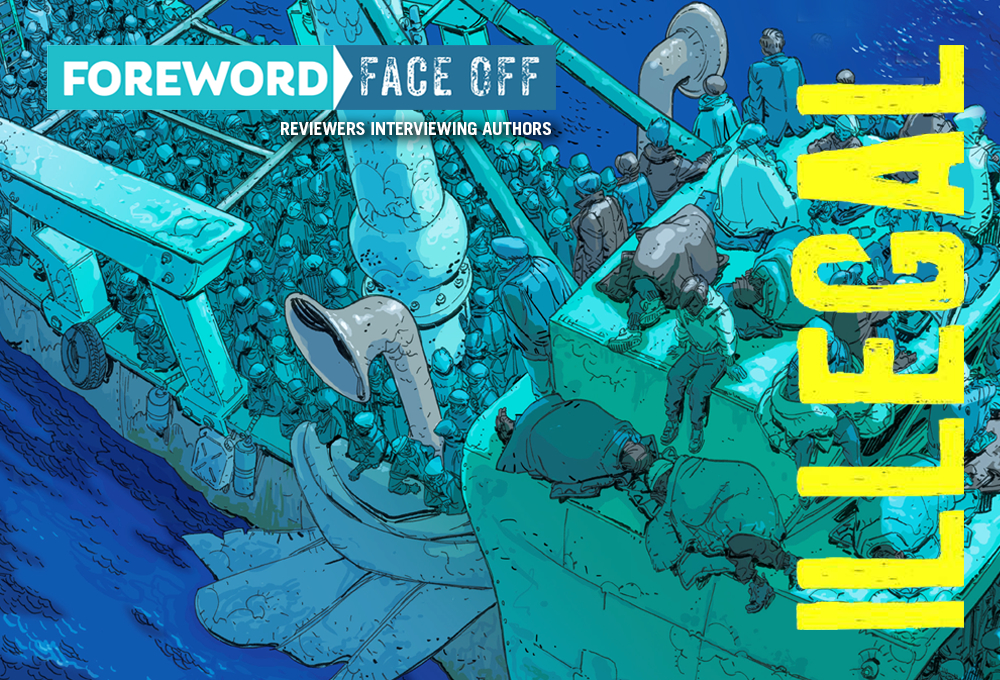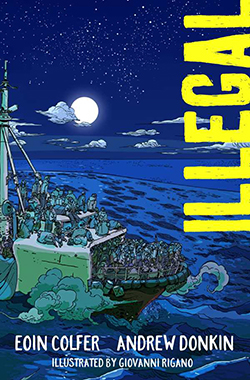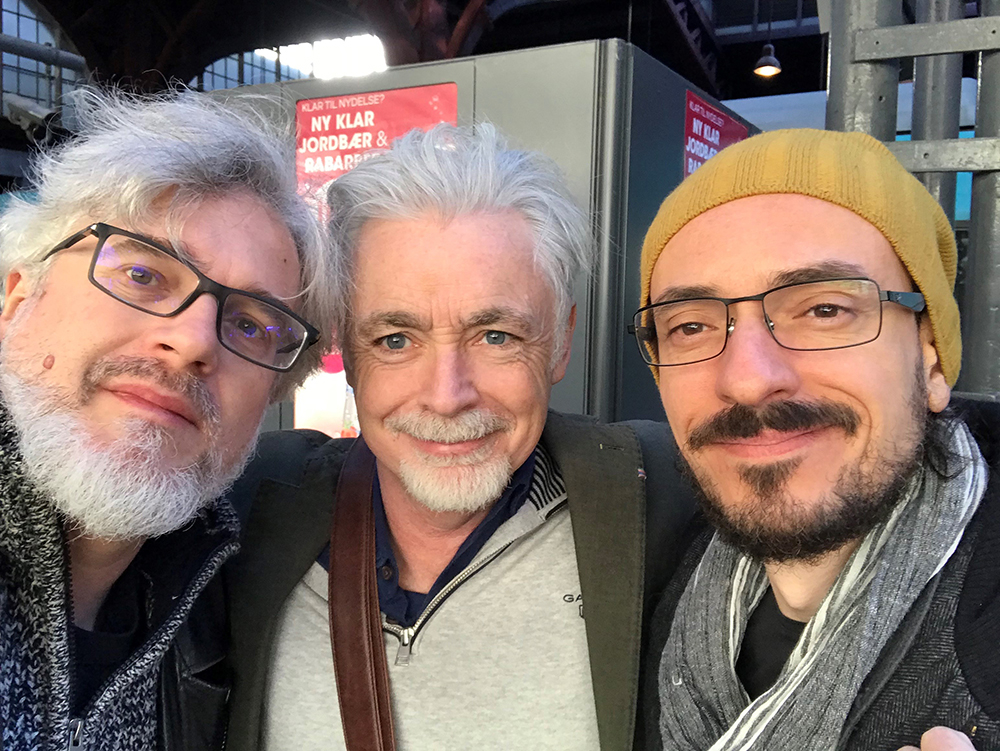Illegal

Reviewer Peter Dabbene Interviews Eoin Colfer and Andrew Donkin, Creators of the Graphic Novel Illegal
All too often, important books sabotage their chances of earning a large readership by using dense, clinical prose and uninviting design. In striving to be taken seriously, these books seemingly take themselves too seriously. It’s a reminder that, no matter the importance of the message, books are also in the entertainment industry.
Immigration, climate change, drought, disease, racism, sexism, poverty, political division, opioid abuse—these are the whopper issues of the day, and books can play a primary role in effecting positive change IF they reach a critical mass of readers.
When deciding whether to review a book in the pages of Foreword Reviews, our review editor necessarily makes a mental list of attributes and flaws—factors like readability, broad appeal, and attractive design (cover and interior) weigh heavily. In reality, she is optimistic about every one of the many thousands of books submitted to us a year, but vigilantly searches for reasons to say no.

For putting a compelling, sympathetic, artful face on Europe’s immigration crisis, we bestow our highest praise on Illegal, a new graphic novel by Eoin Colfer, Andrew Donkin, and Giovanni Rigano (illustrator)—which tells the story of young Ebo’s treacherous journey from Ghana to Tripoli and finally aboard a raft on the Mediterranean. We also commend Sourcebooks for bringing this project to the States.
In his starred review for the July/August issue of Foreword, Peter Dabbene calls the book “outstanding … recommended for all readers of middle school level or higher.”
As we are wont to do, we put Peter in touch with Eoin and Andrew for this week’s Foreword Face Off. You’ll find Special Features and Featured Reviews at the end.
Eoin, you’ve probably been asked this a thousand times, but for the benefit of those who don’t know, how do you pronounce your first name?
EC: It’s a strange one I know—an old Celtic version of John. The pronunciation is: Owen. Easier than it looks.
Illegal tells a very emotional story. Was there a particular event that inspired you to write this? Please tell us a bit about how it all came to pass.
EC: Andrew started following the news pieces about five years ago and then began sending them to me. Once we began to look into this upsetting subject seriously, it became pretty obvious that this was an area where we felt we could contribute something. When we saw Giovanni’s initial sketches we were hooked. We felt that a graphic novel was the way to go because that was our strength as a team and it would be a medium through which to reach a lot of comic readers who wouldn’t normally be interacting with this subject matter.
AD: The idea for Illegal grew from reading small reports in the press no bigger than the size of a postage stamp. I remember reading them and then passing them to Eoin. We waiting for the follow up stories but they never came. This was four years ago, so the book has been a labor of love for all of us for quite a while.
There’s a five page piece at the end of the book that adapts a refugee’s own words to a “visual interview” format. How much of the main story of Illegal is based on actual events or people? What kind of research was involved?
EC: We did more research for Illegal than any previous work as we wanted to be certain it was accurate. Andrew interviewed migrants from two London groups and we put their various stories together into one narrative. I had lived in North Africa for two years and so was able to weave in background and detail from his travels. I think it is true to say that everything on the page happened in real life, though not all to the same person.
AD: Everything in Illegal is true. Every single incident happened to someone—usually, many people. The piece of comics journalism at the end of the book is there because we just wanted to reinforce to readers that this was a real situation and these were real events happening to thousands of real people.
Featuring a narrator who’s a young boy himself, Illegal deals with traumatic events in a way that’s sensitive to young readers. Was it difficult to find the right balance of mature, adult themes versus keeping a young-reader mindset?
EC: In Illegal we needed to tread the fine line of trauma and sensitivity. Both are vital for the book to succeed narratively. We did not want to shy away from the realities but we also wanted to tell an entertaining story that ensured our readers would keep going to the end. I think our sixty years combined experience in telling children’s stories was put to the test in this one and hopefully we succeeded in creating something compelling but also realistic.

Eoin Colfe, Andrew Donkin, and Giovanni Rigano
What was the process/logistics of writing like? You’ve worked together before on the Artemis Fowl graphic novels, but how did you collaborate on this book?
EC: We have been working as a unit for a long time and we have long since established our system of cooperation, which usually consists of phone calls, emails, and Facetimes, but for this book we needed to take it up a gear and do much more face to face—so Andrew and I organised work days in Dublin and London where we could sit down for a few days and work through the story. On previous books we had established source material but for Illegal the source material was the unfolding tragedy in the Mediterranean which changed daily.
AD: We keep working together because we enjoy it so much. Luckily it seems that our readers do too.
What’s in store for the Colfer/Donkin team in the future? Any more Artemis Fowl adaptations, or will you be considering other projects?
EC: The Illegal team have already begun work on the next project. We can’t say too much about it at the moment but it will be closer to Illegal than Artemis Fowl. There are many issues on planet Earth that we are unhappy about. We feel that we are in a unique position to deal with them in a non-preachy, entertaining but still responsible way.
AD: We’ve been really surprised and delighted by the reaction to Illegal. The most rewarding reactions have been from people who are survivors of that journey being pleased that someone has told their story so that other people can read it and maybe understand a bit more about what they’ve been through to get to where they are today. We have our next project underway, but if I say anymore than that I’m gonna get in heaps of trouble.
Peter Dabbene
